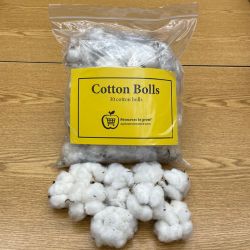Agricultural Literacy Curriculum Matrix
Companion Resource

Cotton Boll Kit
Help your students understand how the fiber in their clothing, towels, and sheets comes from cotton plants. The seeds must be removed from the cotton fibers to make cloth. This process is called ginning (after Eli Whitney's cotton gin; gin is short for engine). The cotton bolls in this kit may be hand ginned, or dissected, allowing students to experience the process of hand ginning, understand the significance of the cotton gin, and explain how machines help us today to be more productive. Each kit contains a classroom set of individually wrapped cotton bolls. Each cotton boll can easily be pulled apart into four distinct sections so that a group of four students may use one cotton boll.
Teacher Note: The purpose of this activity is to investigate cotton, the process of hand ginning cotton, and the impacts of the cotton gin. Adjusting this investigation into a role-play or simulation of a slave activity is absolutely discouraged. In addition, no student should be required to participate in hand ginning cotton. We recommend consulting your administrator and/or communicating with parents prior to presenting this lesson. You may want to consider ginning as a teacher demonstration if you anticipate tension or uncomfortable feelings. For more information concerning teaching about the history of African Enslavement, refer to research conducted by the Southern Poverty Law Center Teaching Hard History: American Slavery. Order this kit online from agclassroomstore.com.
Author
Lessons Associated with this Resource
- Cotton's American Journey (Grades 3-5)
- Applying Heredity Concepts
- Cotton's American Journey (Grades 6-8)
- Clothes on the Grow
- Growing a Nation Era 1a: Seeds of Change
- Growing a Nation Era 1b: Cotton's American Journey
